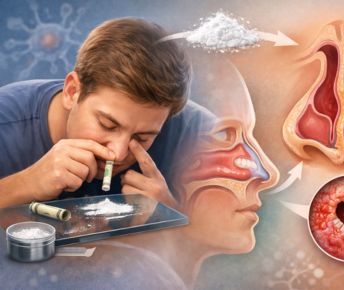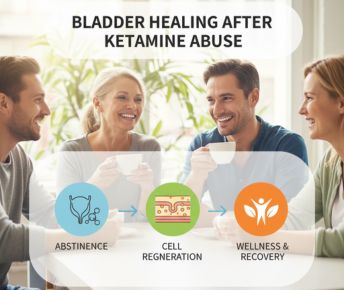Introduction
Psychosis can be one of the most terrifying experiences a person can go through. People can lose touch with reality, experience hallucinations, and have intense delusions that can leave lasting emotional and psychological scars. When this break from reality is triggered by substances like phencyclidine, the consequences can be dangerous. Commonly known as angel dust, PCP is a powerful dissociative drug that alters brain chemistry in ways that can lead to extreme behavioral disturbances and long-term psychosis symptoms.
What makes PCP addiction particularly alarming is how it blurs the line between drug-induced euphoria and psychiatric crisis. Many people experimenting with the substance are unaware of how quickly things can spiral, from short-lived hallucinations to full-blown psychosis from drug use that mimics schizophrenia. Families often find themselves blindsided, watching their loved ones become paranoid, aggressive, or emotionally detached often with little understanding of the root cause.
In this blog, we’ll understand the key signs of PCP-induced psychosis, explain how psychosis substance abuse differs from other mental health disorders, and break down treatment options that focus not only on detox but on long-term recovery and stabilization. Whether you’re trying to understand a loved one’s sudden behavioral change or you’re seeking answers for yourself, this guide aims to provide clear, compassionate, evidence-based insight.
Understanding PCP-Induced Psychosis
PCP-induced psychosis isn’t just a medical term, it’s a frightening, disorienting reality for many individuals and their families. When someone uses phencyclidine, also known as angel dust, the drug disrupts how the brain processes reality. What might start off as a sense of detachment or distorted perception can quickly snowball into severe confusion, paranoia, aggression, or hallucinations. This is because PCP is a psychotropic substance which alters the way the brain communicates with itself.
In high doses or frequent use, it can cause psychosis from drug use, where the person may no longer distinguish between what’s real and what’s imagined. Unlike fleeting side effects, PCP addiction can cause these symptoms to persist well beyond the initial high. Over time, repeated use may even lead to a form of substance-induced psychosis that mimics chronic mental illnesses like schizophrenia.
Common Symptoms of PCP Psychosis
When someone experiences PCP-induced psychosis, the shift in their behavior is often drastic and alarming, not just for the person using, but also for those around them. The symptoms can be unpredictable, and many times, they mirror serious mental health conditions like schizophrenia or bipolar disorder. Recognizing these early signs is crucial for seeking timely help.
Here are some of the most common symptoms seen with psychosis from drug use, especially related to PCP addiction:
Hallucinations (Auditory and Visual): People under the influence of phencyclidine (PCP) often report seeing or hearing things that aren’t real. These hallucinations can be vivid and terrifying—like hearing voices commanding them or seeing threatening figures. This distortion of reality is one of the key indicators of substance-induced psychosis.
Extreme Paranoia and Delusions A person may become irrationally suspicious, believing that others are watching, judging, or trying to harm them. These delusions often fuel aggressive or erratic behavior, making it difficult for friends or family to offer support.
Aggression and Violent Outbursts Unlike many other substances, angel dust is notorious for causing sudden, unprovoked aggression. Someone in a psychotic state might lash out, even at loved ones, due to a perceived threat. These behaviours can be dangerous and often lead to legal trouble or hospitalization.
Disorientation and Memory Loss It’s common for individuals to appear confused or disconnected from their surroundings. They may not remember where they are, how they ;t there, or what happened while under the drug’s influence. Over time, repeated use can lead to more lasting cognitive impairments.
Lack of Pain Sensation: PCP can interfere with pain perception. During psychotic episodes, individuals might injure themselves without realising it. This symptom is particularly dangerous because it increases the risk of severe physical harm.
Emotional Blunting or Detachment: Some may seem emotionally numb or expressionless, showing little concern for things that would normally cause fear, sadness, or happiness. This emotional shutdown is often a byproduct of long-term psychosis substance abuse.
Poor Judgment and High-Risk Behavior: People experiencing angel dust addiction may engage in impulsive, dangerous activities, such as jumping from heights or driving recklessly, believing they are invincible or immune to harm.
What Is Angel Dust? Unveiling the Reality Behind Phencyclidine (PCP)
Long-Term Impact of PCP Addiction
Addiction to phencyclidine, also known as angel dust, doesn’t just affect someone in the moment. Over time, the drug leaves lasting damage on the brain, body, and relationships. While the initial high may seem euphoric or powerful, chronic use often leads to devastating consequences that are difficult to reverse. The longer someone stays trapped in the cycle of PCP addiction, the harder it becomes to break free without medical and psychological support.
Here are some of the long-term effects individuals may face:
Persistent Psychotic Symptoms: Even after stopping the drug, some people continue to experience psychosis symptoms like hallucinations, paranoia, and delusional thinking. This is known as substance-induced psychosis, and in some cases, it mimics chronic mental illnesses like schizophrenia. The brain, after repeated exposure to PCP, may struggle to return to its natural state.
Severe Memory Loss and Cognitive Decline PCP interferes with the brain’s memory and learning centres. Long-term users often have trouble concentrating, making decisions, or recalling basic information. This cognitive fog can persist for months or even years after quitting the drug, affecting everything from work performance to personal safety.
Emotional Instability and Depression Many long-term users experience emotional numbness, sudden mood swings, or long periods of depression. The chemical imbalance caused by psychosis substance abuse often impacts emotional regulation, leaving individuals feeling disconnected, hopeless, or irritable. Relationships frequently suffer as a result.
Social Withdrawal and Relationship Damage PCP addiction often isolates people from those they care about. As trust erodes and behaviour becomes unpredictable, loved ones may distance themselves. Social circles shrink, leading to loneliness and further reliance on the drug as a coping mechanism.
Physical Health Complications lthough known for its psychological effects, angel dust addiction also impacts physical health. Users may suffer from muscle breakdown, weight loss, high blood pressure, and increased risk of injury (often from engaging in reckless or violent acts). The body becomes worn down from constant chemical assault.
Increased Risk of Fatal Accidents or Suicide Because PCP blunts pain and distorts perception, long-term users are at high risk for accidents, self-harm, and even suicide. Combined with delusions and hallucinations, users may act on dangerous thoughts believing they are invincible or being pursued.
Difficulty with Long-Term Recovery The damage PCP does to the brain’s reward system can make recovery especially difficult. Cravings can be intense, and co-occurring conditions like substance-induced psychosis or depression can make relapse more likely without specialised treatment.
Treatment for PCP-Induced Psychosis
Recovering from PCP-induced psychosis can feel overwhelming, but healing is possible with the right support system. The treatment process isn’t just about stopping drug use; it’s about addressing the full scope of damage caused by angel dust addiction, from distorted thinking and hallucinations to emotional instability and social withdrawal. At its core, recovery means helping the brain relearn how to function without phencyclidine, and helping the individual rebuild trust in themselves and the world around them.
Here’s how treatment for PCP-induced psychosis typically takes place:
Medical Detox & Stabilization: The first step is safely removing PCP from the body under 24/7 medical supervision. Because withdrawal can bring agitation, confusion, and even aggression, a controlled, calm setting is crucial. Medications may be prescribed to reduce symptoms and manage psychosis in the short term.
Diagnosis & Dual Disorder Management: It’s often difficult to tell whether psychotic symptoms are caused by drugs alone or if an underlying mental illness exists. Clinicians at Samarpan conduct thorough psychiatric evaluations to assess whether the person is experiencing substance-induced psychosis or a co-occurring disorder such as schizophrenia or bipolar disorder. This clarity is key for the right treatment path.
Psychotherapy (CBT & More): Therapy is at the heart of long-term recovery. Cognitive Behavioral Therapy (CBT) helps individuals challenge delusions, reframe irrational thoughts, and develop coping strategies. Trauma-focused therapies may also be introduced to help address any past experiences that contributed to PCP addiction.
Medication Management: If psychotic symptoms persist, antipsychotic medications may be prescribed short- or long-term. These help regulate brain chemistry and provide mental stability while therapy works at a deeper level. Medication is always used judiciously and reviewed regularly for effectiveness.
Family Education and Support: EAddiction and psychosis don’t just affect one person, they impact everyone close to them. Family therapy helps rebuild communication, restore trust, and educate loved ones on how to support recovery without enabling relapse.
Conclusion
PCP-induced psychosis can feel like a terrifying descent, marked by confusion, paranoia, and a frightening loss of control. But it’s important to remember: what begins in chaos doesn’t have to end there. With the right care, people not only recover from psychosis from drug use, but go on to rebuild meaningful, fulfilling lives.
At Samarpan Recovery, we understand the complex relationship between psychosis substance abuse, mental health, and trauma. Our approach is rooted in compassion, clinical expertise, and long-term support because true recovery isn't just about quitting drugs; it's about reclaiming your mind, your relationships, and your sense of self.
Struggling with PCP addiction or experiencing symptoms of angel dust-induced psychosis can be overwhelming, but recovery is possible. The earlier treatment begins, the greater the chances of lasting healing and stability.
Frequently Asked Questions
1.How serious is drug-induced psychosis?
Psychosis from drug use, especially involving psychotropic substances like angel dust, can be extremely serious, leading to delusions, paranoia, and dangerous behavior. Without timely intervention, it may cause long-term damage or worsen underlying mental health conditions.
2. Can a person recover from drug-induced psychosis?
Yes, with proper treatment and support, many individuals recover from substance-induced psychosis. Early diagnosis, therapy, and addressing the root psychosis substance abuse can significantly improve outcomes.
3. What is PCP-induced psychosis?
PCP-induced psychosis is a mental health condition triggered by using phencyclidine, causing hallucinations, aggression, paranoia, and detachment from reality. It’s one of the most dangerous forms of psychosis from drug use.
4. What are the symptoms of drug psychosis?
Common psychosis symptoms include hallucinations, delusions, confusion, paranoia, and erratic behavior. These symptoms often result from angel dust addiction, long-term PCP addiction, or misuse of other psychotropic substances.
























 Yes, many offer serene environments and solid therapeutic frameworks. However, quality varies, so it’s essential to research accreditation, staff credentials, and therapeutic depth.
Yes, many offer serene environments and solid therapeutic frameworks. However, quality varies, so it’s essential to research accreditation, staff credentials, and therapeutic depth.




